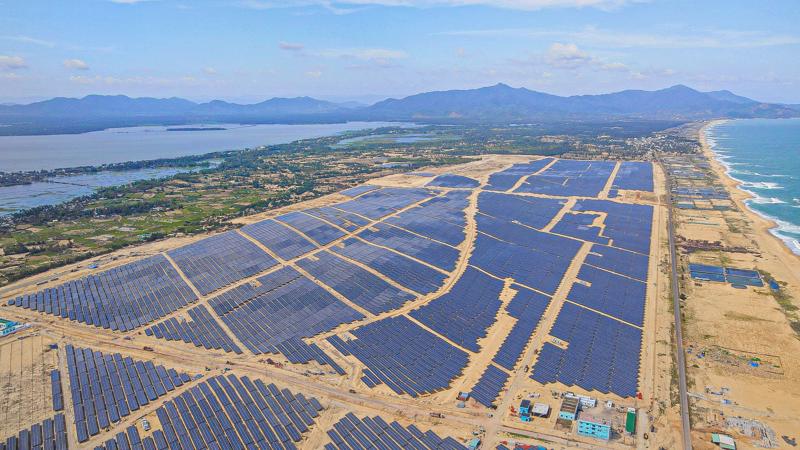The Hanoi Stock Exchange (HNX) announced on July 23 its approval for 730 million shares of BGE, belonging to the BCG Energy JSC - a member of the Bamboo Capital Group - to be traded on UPCoM. The first trading day for BGE will be July 31, with a reference price on the first trading day set at VND15,600 ($0.61) per share, with a fluctuation range of /- 40 per cent. The total of 730 million shares is therefore equivalent to a market capitalization of VND11.388 trillion ($446.59 million).
BCG Energy began its IPO process in 2023 and officially became a public company on May 20. On June 18, the Vietnam Securities Depository (VSDC) issued the stock code BGE. The upcoming UPCoM trading from July 31 marks a significant milestone in BCG Energy’s journey towards becoming an officially listed company.
Established in 2017, BCG Energy is the core energy subsidiary of the Bamboo Capital Group. The company currently has charter capital of VND7.3 trillion ($286.27 million), nearly VND10 trillion ($392.16 million) in equity, and total assets nearing VND20 trillion ($784.31 million). Operating approximately 600 MW of solar power, it is among the top 3 renewable energy companies in Vietnam.
BCG Energy has consistently reported positive results over the past three years. In 2021, the company posted revenue of VND760 billion ($29.80 million), which grew by a significant 40 per cent to VND1.064 trillion ($41.76 million) in 2022. In 2023, BCG Energy’s net revenue increased by 5.8 per cent to over VND1.125 trillion ($44.12 million), driven by the high efficiency, at over 100 per cent of projections, of its solar power plants and rooftop solar systems.
Its debt-to-equity ratio has continually come down over the years. As of the end of 2021, it stood at 2.77-times, falling to 1.9-times by the end of 2022, and further declining to just 0.96-times by the end of 2023. This is safe and significantly lower leverage compared to other listed companies in the same industry.
Regarding 2024 business results, in the first quarter of this year, BCG Energy’s renewable energy sector contributed the most revenue to the Bamboo Capital Group’s total, accounting for 32.5 per cent, or VND320.4 billion ($12.57 million). The renewable energy sector is expected to be the main contributor to the group’s revenue and profit in the quarters ahead.
BCG Energy currently owns a portfolio of nearly 1 GW approved under PDP8 to be implemented by 2030. Of note, a series of large-scale wind power projects, including Dong Thanh 1 (80 MW) and Dong Thanh 2 (120 MW) in Tra Vinh province and Khai Long 1 (100 MW) in Ca Mau province, will be implemented this year and are expected to be operational by 2025. Once these projects come online, they will increase BCG Energy’s total power generation capacity by about 53 per cent.
BCG Energy also operates large-scale solar power plants such as BCG Long An 1, BCG Long An 2, BCG Vinh Long, BCG Phu My, and Krong Pa 2. The company is also developing rooftop solar systems in many provinces around the country, and implementing nearshore wind power projects in Ca Mau, Soc Trang, and Tra Vinh provinces and researching potential wind power projects in Dien Bien province.
Recently, BCG Energy has secured partnerships with large international corporations and financial institutions investing in Vietnam, such as international energy groups the SP Group, Sembcorp, the SK Group, the Hanwha Group, the Leader Energy Group, SLC (Sudokwon Landfill Site Management Corp), and others.
With the experience of a leading clean energy company in Vietnam, on January 31 BCG Energy acquired the Tam Sinh Nghia Development Investment Company, officially entering into the waste-to-energy sector. On July 20, the Bamboo Capital Group and BCG Energy successfully held a breaking ground ceremony for the Tam Sinh Nghia waste-to-energy plant in Thai My commune, Cu Chi district, Ho Chi Minh City.

Phase 1 of the plant, to be built from 2024 to 2025, has total investment of VND6.4 trillion ($252 million), a waste incineration capacity of 2,000-2,600 tons a day, and a power generation capacity of 60 MW. The plant’s projected annual electricity output is up to 365 million kWh, meeting the electricity needs of about 100,000 households while reducing carbon dioxide emissions by approximately 257,000 tons a year.
Phase 2 of the project, expected to be implemented in 2026-2027, will increase the waste incineration capacity to 6,000 tons a day and the power generation capacity to 130 MW, making it the largest waste-to-energy plant in the world. Phase 3, scheduled for 2027 to 2029, aims to increase the waste incineration capacity to 8,600 tons a day and power generation capacity to 200 MW.
BCG Energy will soon implement similar waste-to-energy plant projects in Long An and Kien Giang provinces. These projects will help strengthen and elevate BCG Energy’s leading position in Vietnam’s renewable energy sector.









 Google translate
Google translate